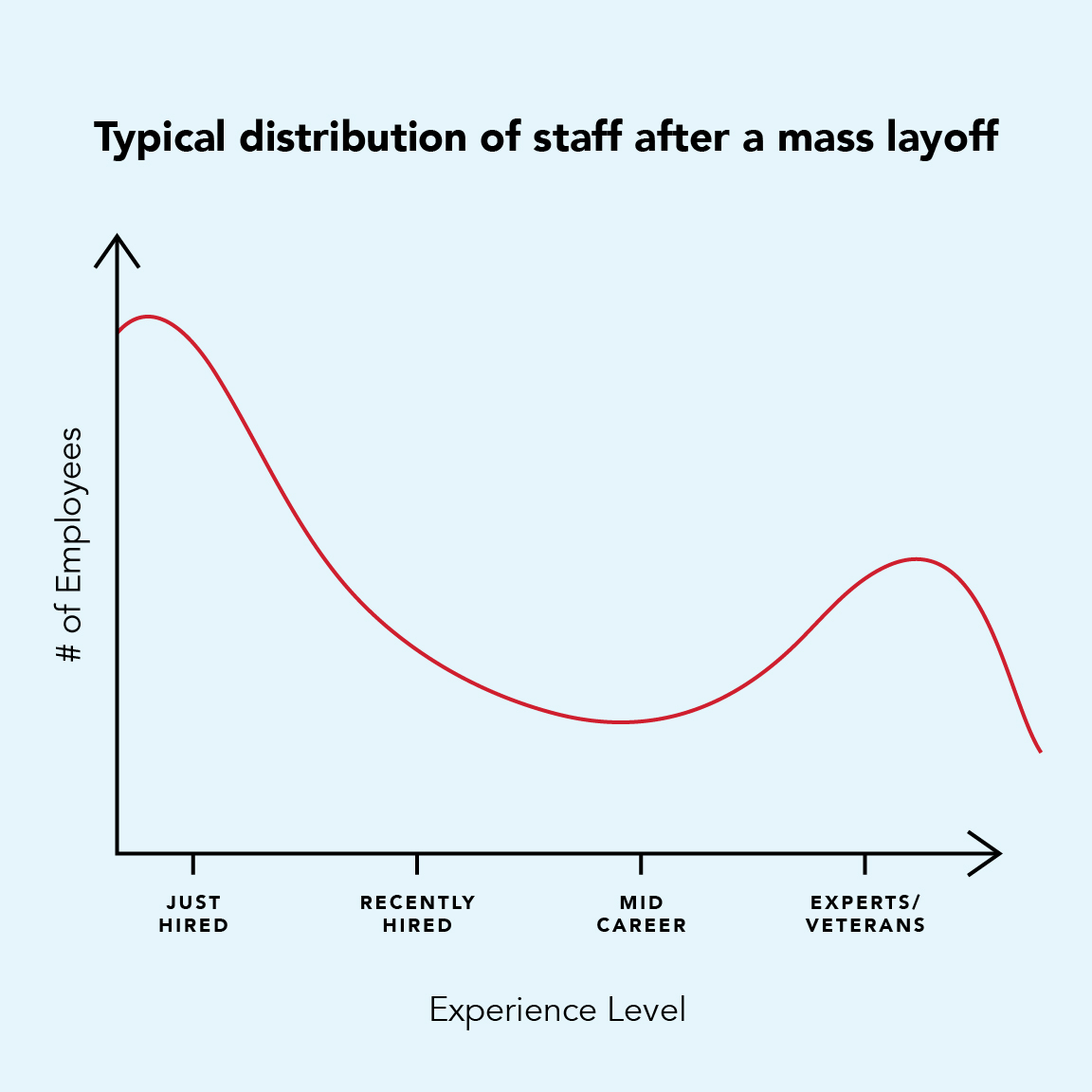By Michael Taiwo, PhD
Michael, a first class chemical engineering graduate of Obafemi Awolowo University, Ile-Ife, Nigeria, and a PhD holder in same discipline from the University of Arkansas, United States, works in a major energy company. In his free time, he mentors and coaches a growing number of students – from high school to grad school – from all over the globe, gives speeches and judges science fairs. He is passionate about making people become better version of themselves. He is the author of the book Dream: A Reminder to Graduates and Anyone Beginning Anew. He also shares his thoughts on his website, thedreambook.net.
***
Mass layoffs are part of corporate life. Rather than fear layoffs, a more pragmatic approach would be to accept them as reality and understand how to play this game strategically. In this article, I offer three ways to protect your career during these corporate storms.Disruptive technologies. Automation. Increasing competition. A new CEO with a different strategy. New regulations. These are just few of the reasons why a company may decide it is time to downsize. (They, of course, call it “right-size”…however, I have yet to see a company “right-size” upward.)
Unless you work for the government, you will likely experience a mass layoff at least once if not multiple times before your career is over. A layoff is nothing to be afraid of. No one, of course, wants to lose their job. But the way to protect yourself isn’t by cowering; the best strategy to ensure your own job security is to master the rules of the game. You cannot control technological trends or who your next CEO will be, but the following tips are within your reach. They will not only help you survive a layoff but thrive in your career.
Rule #1: Be at the core.
Location is everything. When a company starts to shrink, it will cut the “fat” first before touching the “muscle.” It’s natural. If one is stranded on a desolate island without food, the body will burn its fat first—and not lean meat—for energy. It’s the very reason the body carries fat around. Organizations are like that. They know they have some fat, but they carry it around anyway for protection. But when austerity strikes, the fat is the first thing sacrificed.
Do all that you can to be in a core department of your business. These are the departments of a company that, without which, the business cannot adequately function. Based on this rule, a computer science graduate is better placed in an Information Technology (IT) firm than in the IT department of, say, a trucking business. If an IT firm is in trouble, the company drivers will get fired before the computer scientists; but if a trucking business is in trouble, the computer scientists will get kicked off before the drivers.
Please note: It is easy to fall into the trap of thinking that your job is essential to the company’s business. Why else would they hire, train, and pay you? But don’t kid yourself. If the company doesn’t need your team, or as many people in your team, to survive…you can consider yourself in a “fat” department.
Rule #2: Be a studious student.
Two groups of workers are particularly at risk of being laid off during a corporate restructuring: those who are a few years into their roles and those who have been with the company for a very long time. Rule #2 addresses the former; Rule #3, the latter.
Companies typically protect their most recent hires in a layoff. Recent hires, especially new graduates, are often safer and have more job security than those who have been with the company for some years. There are two reasons for this. One, the perception is that recent hires are more teachable and more likely to embrace the new direction the company is heading; and two, they cost less in terms of salaries and benefits.
The same cannot be said, though, for those who have been with the company for a little longer. They are not as cheap to keep, and they know enough established ways of working at the company to be resistant to change, but not enough to be considered subject matter experts. Your job is to challenge this perception.
You need to be a student, again. If you are in this at-risk group, i.e., not a new hire but not a veteran either, you need to give the impression that you are very teachable. Continue to learn better ways of doing your job, and, more importantly, let your progress be evident to all. In school, an exam verifies that knowledge has been successfully transmitted. There’s no such clear feedback at work, so you need to find ways to display to your boss and to your boss’s boss that you have mastered new things.
More importantly, appear excited about your company’s proposed strategies. Be sympathetic that some will lose their jobs, but appear understanding of why the difficult decisions need to be made. This advertised outlook will save you. I have seen this approach help others to keep a job time and time again.
Rule #3: Be a likable teacher.
Veterans, that is, those who have been with the company the longest are the second at-risk group during a mass firing. Age discrimination is alive and well in corporations. You can fight this, if HR is careless enough to make it obvious. However, you stand a better chance of retaining your job if you understand how to turn the supposed weakness—your seniority—into a strength.
The look of a newly restructured company is roughly represented by the chart below.

This chart is for illustrative purposes only, it has not been drawn from any actual data
The ones just hired enjoy a sort of temporarily protected status. They have little to no expertise, but they are cheap and teachable. To teach them, however, the company needs teachers. In my experience, those who like to share their knowledge and teach new recruits are almost guaranteed to survive a cut. They are priceless to the company’s future. But this is not as easy to pull off as it sounds. Most people who have been doing their job for decades find it hard to put themselves in a beginner’s mindset and either can’t or won’t teach newcomers. Some of them think that by giving away their knowledge, they are making themselves redundant and therefore hoard information. How counterproductive! Give your knowledge away and everyone will start to see you as an invaluable resource. This is how you keep your job.
To justify your presence in the company long-term, you need to do more than deliver the goods; you need to start an informal/semi-formal teaching program. Call it “Lunch and Learns” or “Info Sessions” or “Ask Mike,” or whatever works. But make it clear to all that you are educating the new generation of employees on what you know. Do this without being told. Do this cheerfully. And soon you will find yourself developing new skills—teaching, and deepening old ones—your technical/business acumen. Even more crucial, you will retain your post, or even get promoted.
In sum, layoffs are a given in today’s competitive economy, and job security is hard to come by. But by being in an essential, rather than support, role, by learning rabidly if you are younger, and teaching cheerfully if you are older, you turn the odds of keeping your job considerably in your favor.
What other strategies have you used or seen others use successfully to avoid being laid off during a downsizing? Please share! You may be saving someone’s job. Thanks.
Editor’s Note: Article first published in 2018.
Established in March 2013, JarusHub is a Nigerian information hub with focus on career and management. It is rated Nigeria's most authoritative destination for online career resources. It parades an array of Nigerian professionals who share their career experiences with a view to bridging career information gap and mentoring a generation to success. Whether you're a student, a recent graduate or an established professional, or even an executive, you will always find something to learn on JarusHub. All enquiries to jarushub@gmail.com or 0808 540 4500. Facebook: www.facebook.com/jarushub; Twitter: @jarushub or @mcjarus.
Attend JarusHub’s 2024 Seplat Assessment Center Coaching
October 29, 2024
2 comments
Let us have your say by leaving a comment belowCancel reply
Recommended For You
-
Two Can Play: A Tale of Government and Young People (ii)
April 17, 2013 -
BEST TIME TO START ACCOUNTING PROFESSIONAL EXAM
July 30, 2015 -
AJETUNMOBI’s MONDAY INSIGHT: Tips for Academic Success
February 3, 2014




Well done with this article! I really like the way you present it and the way you make it interesting
This forum is amazing and there is a lot of useful content here. Companies can use this content to further improve the quality of disposable nitrile gloves even though they have not received any complaints about them yet. However, there is still room for improvement.